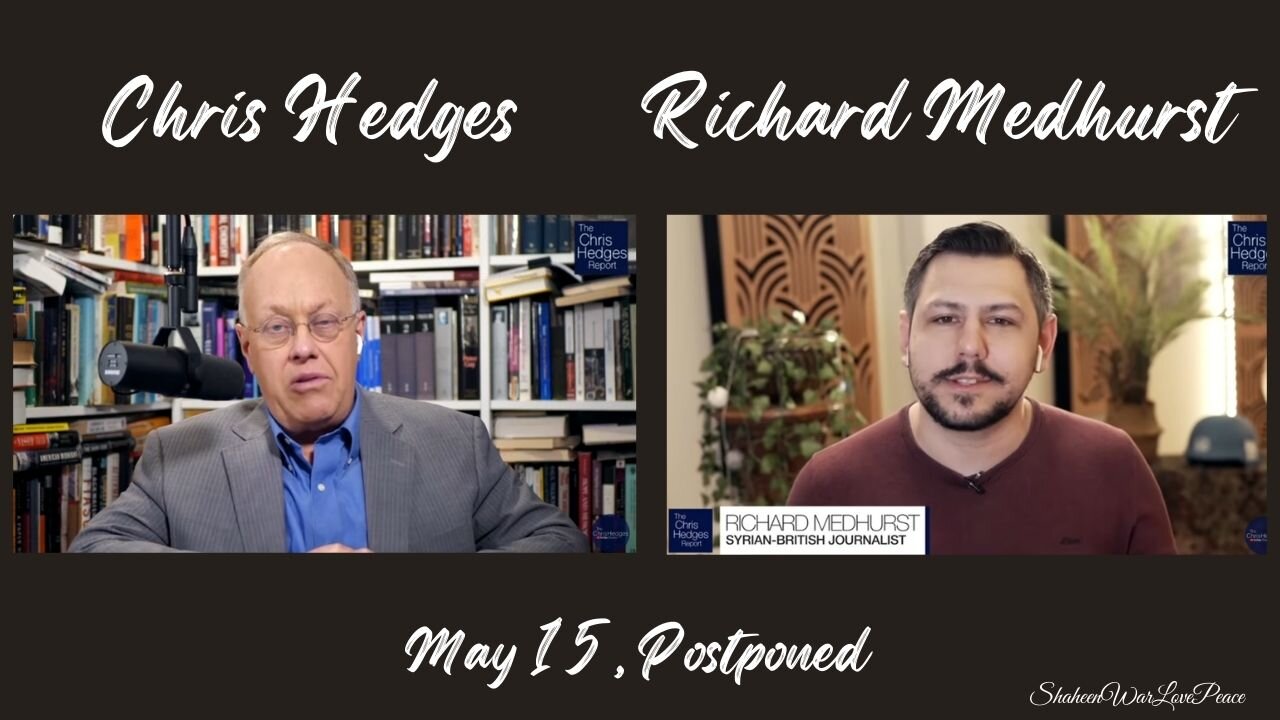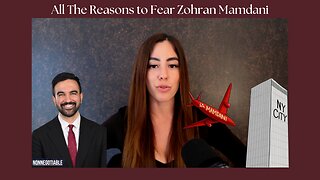Premium Only Content

The Chris Hedges Report with Richard Medhurst | A Journalist Under Investigation — May 15 Postponed
April 30, 2025.
Chris Hedges, Pulitzer Prize-winning journalist, has condemned the UK’s arrest of Richard Medhurst under the Terrorism Act, calling it what it is:
“An attempt to silence journalists who challenge Western narratives — especially on Israel and Palestine.”
In this April 30th interview, Hedges speaks directly with Medhurst, who describes his ongoing legal ordeal. Though he has not been charged with any crime, Medhurst remains under investigation. His May 15 police surrender date has been postponed, but his freedom remains uncertain — a stark example of how anti-terror laws are now being used not to prosecute wrongdoing, but to apply pressure on independent journalists.
Hedges warns that this approach sets a dangerous precedent — one that risks criminalizing legitimate reporting and further eroding press freedom.
Richard Medhurst: Targeted for Journalism
Richard Medhurst has spoken out directly, rejecting all allegations and standing firm in his role as a journalist:
“I categorically and utterly reject all the accusations by the police. I am not a terrorist. I have no criminal record. Prior to this incident, I'd never been detained in my entire life.”
He was detained under Section 12 of the UK’s Terrorism Act, with police demanding access to his GrapheneOS phone — a secure, privacy-focused device used to protect his sources and investigations.
By refusing to unlock the device, Medhurst is not obstructing justice — he is defending the very foundation of journalism: the right to protect those who share the truth at great risk.
Digital Armor: Tools of the Press
Medhurst’s mention of GrapheneOS places him among a growing movement of journalists who understand that press freedom today isn’t just about what you say — it’s about how you protect your sources.
Edward Snowden, who exposed global surveillance by the NSA, has long championed secure, open-source tools to defend against state overreach. These include:
GrapheneOS – Hardened privacy OS for mobile (used by Medhurst)
Qubes OS – Desktop OS with compartmentalized security
Tails OS – Amnesic live system that leaves no trace
Signal – End-to-end encrypted messaging
ProtonMail & ProtonVPN – Secure Swiss-based email and browsing
These tools are the digital armor for journalists — essential in an era where the First Amendment is under pressure.
A Breach of Rights?
Richard Medhurst's case falls directly under Article 10 of the UK Human Rights Act 1998, which enshrines the European Convention on Human Rights into British law. It guarantees:
“Everyone has the right to freedom of expression... including the freedom to hold opinions and to receive and impart information and ideas without interference by public authority.”
While Article 10 allows restrictions in the interest of national security, these must be lawful, necessary, and proportionate. Applying terrorism laws to a journalist for protected speech appears to violate this standard — and threatens the democratic fabric of the UK.
The Bigger Picture
Richard Medhurst’s case reflects a broader trend affecting journalists across the UK and beyond — where critical reporting is increasingly met with legal pressure and suspicion. Rather than being treated as members of a free press, reporters are being quietly labeled as security concerns, simply for doing their jobs.
From Julian Assange to Craig Murray to Kit Klarenberg, the pattern is growing: those who shine too much light on the inner workings of power are often met not with debate, but with detention, surveillance, or threats.
And yet, even in the face of this pressure, journalists continue — not for fame or conflict, but because they see it as a duty to keep the public informed.
The Journalism Community Responds
The arrest and continued investigation of Richard Medhurst have sparked concern across the journalism world. Speaking on his behalf, the National Union of Journalists (NUJ) — representing over 30,000 media professionals in the UK and Ireland — and the International Federation of Journalists (IFJ) — which speaks for more than 600,000 journalists in over 140 countries — have condemned the use of anti-terror laws to silence a reporter. Their united voice sends a clear message: journalism is not a crime, and targeting those who expose power undermines press freedom for all.
This message has also been echoed in reporting by outlets such as Press Gazette, The New Arab, and the World Socialist Web Site (WSWS) — each raising alarm about the dangerous precedent being set. While the NUJ and IFJ have led with the strongest public condemnation, these additional voices reflect a growing awareness that Medhurst’s case is not isolated — it’s part of a wider crackdown on independent journalism.
If journalism is treated as a threat, then solidarity becomes the last line of defense.
Still Not Free
Though Richard Medhurst has not been charged with a crime, he is not free. Held under the UK’s Terrorism Act, with his surrender postponed and his devices still likely in police custody, he remains caught in a system that punishes without prosecuting. This legal limbo — combined with pressure to compromise his sources — is a calculated constraint on press freedom, and a quiet warning to all who dare to speak in the name of freedom.
His legal situation in Austria remains unresolved, and much like the UK case, it carries the weight of uncertainty. Though his public reporting has slowed, Medhurst’s body of work continues to speak for itself — a record of fluent, in-depth analysis of global conflict and power. Known for his multilingual fluency, military and geopolitical expertise, and fearless independent journalism, he remains one of the most trusted voices on wars in Gaza, Middle East, and beyond.
While millions of followers — and the wider public — await the conclusion of proceedings in both the UK and Austria, many also await something greater: his return to the front lines of investigative journalism.
Though his ability to report freely has been disrupted, Medhurst has not gone silent. In a recent video titled “Did the Israeli Embassy Order My Arrest?”, he continues to raise the alarm about the political forces behind his detention.
Once a journalist always a journalist — it’s in the blood, the birthright
Support the show on Patreon: https://patreon.com/richardmedhurst
Donate on PayPal: https://paypal.me/papichulomin
Donate on GoFundMe: https://gf.me/u/yctyrt
Support Richard Medhurst:
Twitter: https://twitter.com/richimedhurst
Support the show on Patreon: https://patreon.com/richardmedhurst
Donate on PayPal: https://paypal.me/papichulomin
Donate on GoFundMe: https://gf.me/u/yctyrt
Richard Medhurst on Twitter: https://twitter.com/richimedhurst
The Chris Hedges Report
YouTube Channel:
-
 15:59
15:59
ArynneWexler
7 hours agoAll The Reasons You're Right to Fear Zohran Mamdani | NN6
9.54K1 -
 LIVE
LIVE
Side Scrollers Podcast
12 hours ago🔴FIRST EVER RUMBLE SUB-A-THON🔴DAY 4🔴BLABS VS STREET FIGHTER!
1,029 watching -
 LIVE
LIVE
DLDAfterDark
3 hours agoGlock's Decision - How Could It Impact The Industry?
321 watching -
 25:57
25:57
The Kevin Trudeau Show Limitless
1 day agoThe Sound Of Control: This Is How They Program You
38.6K8 -
 8:29
8:29
Colion Noir
14 hours agoThree Masked Idiots Show Up at Her Door — Here’s What Happened Next
46K27 -
 15:38
15:38
Cash Jordan
9 hours agoPortland Zombies EMPTY 52 Stores… Mayor FREAKS as “Sanctuary” SELF DESTRUCTS
56.1K74 -
 1:23:21
1:23:21
Precision Rifle Network
1 day agoS5E4 Guns & Grub - Dustin Coleman of ColeTac
13.3K3 -
 1:09:25
1:09:25
Donald Trump Jr.
9 hours agoCorrupt UN Carbon Tax Exposed, Interview with John Konrad | TRIGGERED Ep.285
159K79 -
 42:58
42:58
TheCrucible
7 hours agoThe Extravaganza! EP: 59 with Guest Co-Host: Rob Noerr (10/23/25)
95.5K7 -
 1:40:59
1:40:59
Kim Iversen
8 hours agoTrump Threatens To End ALL Support For Israel
81.8K221